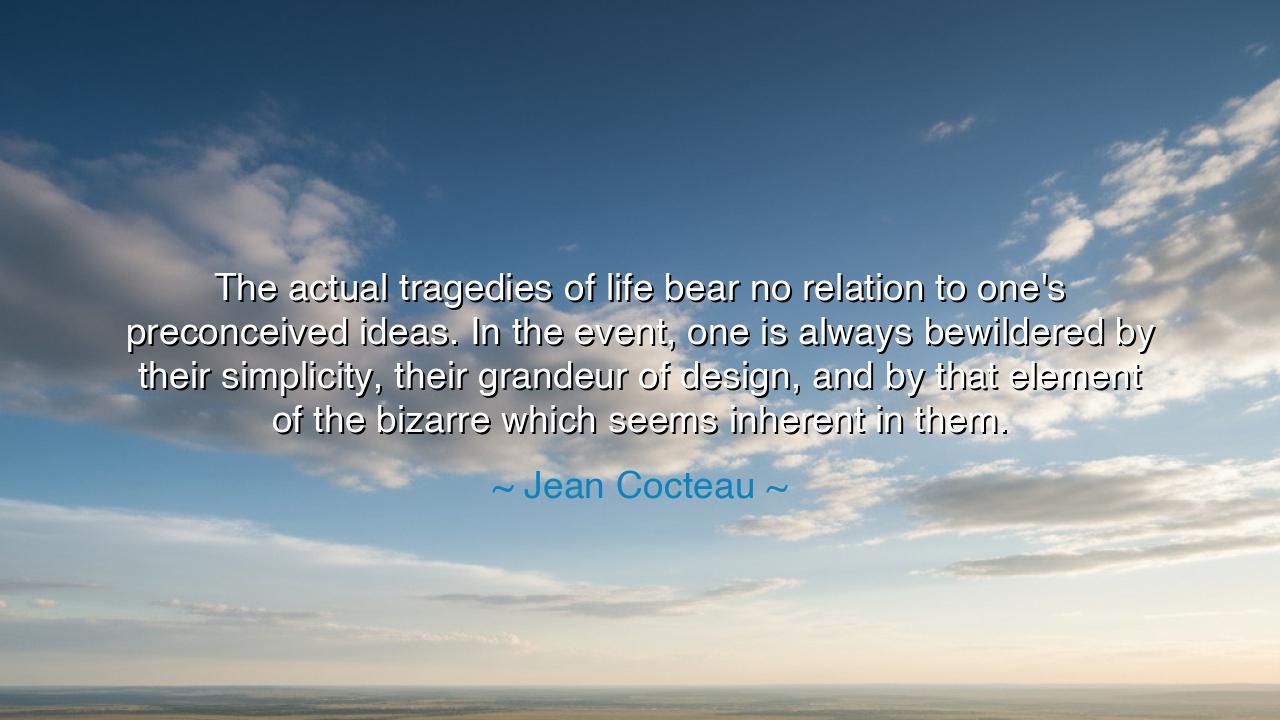
The actual tragedies of life bear no relation to one's
The actual tragedies of life bear no relation to one's preconceived ideas. In the event, one is always bewildered by their simplicity, their grandeur of design, and by that element of the bizarre which seems inherent in them.






“The actual tragedies of life bear no relation to one's preconceived ideas. In the event, one is always bewildered by their simplicity, their grandeur of design, and by that element of the bizarre which seems inherent in them.” – Jean Cocteau
Hear these words, O wanderers of the human soul, and let them sink deep into your heart like the slow turning of fate’s wheel. The poet Jean Cocteau, that visionary of paradox and beauty, spoke them not as a scholar of sorrow, but as one who had walked through the fire of tragedy and returned to tell of its strange light. His words remind us that tragedy—true, raw, uninvited tragedy—is not what we imagine it to be. The mind, in its arrogance, weaves stories of what pain might look like, how we would act, how others would respond. But when tragedy comes—as it always does—it strips away illusion, revealing a face far simpler, grander, and more bewildering than we could ever have conceived.
For the tragedies of life are not the melodramas of imagination. They do not arrive with fanfare, nor do they unfold with the neat symmetry of a play. They come quietly, suddenly, and with a terrible simplicity—an illness, a letter, a single word that changes everything. What Cocteau calls their “grandeur of design” is not the beauty of artifice, but the solemn majesty of truth—the way the smallest acts and moments can hold the weight of eternity. And within them always lingers “the bizarre”, that strange touch of irony or absurdity that life seems to love, as if to remind us that even in our suffering, we are still bound by mystery.
Think of Socrates, condemned to drink the hemlock for teaching wisdom. The moment was not filled with thunder or divine intervention—it was calm, ordinary, almost mundane. He spoke gently to his students, asked them not to weep, and took the cup with steady hands. The tragedy was vast—the death of philosophy’s father—but it unfolded in simplicity. There was no chaos, no glory, only serenity and silence. Yet within that silence dwelt the grandeur of design that Cocteau speaks of: a man dying for truth, meeting death as calmly as one greets the dawn. The bizarre, too, was there—the absurdity of a city killing its wisest son in the name of justice. Thus, tragedy revealed itself not as spectacle, but as a strange marriage between beauty, order, and cruelty.
So it is in all our lives. When tragedy descends, we expect thunder, and instead, we get stillness. We imagine that time will shatter, but it continues to flow, indifferent to our grief. A mother buries her child, and the world keeps spinning. A friend betrays another, and the sun still rises. It is this quiet indifference, this simplicity of life’s persistence, that bewilders us most. The grand machinery of the universe continues, even as our hearts break. And in that continuation lies the grandeur of design—for life, in its wisdom, teaches us endurance through its own unrelenting rhythm.
Yet, Cocteau’s mention of the bizarre should not be overlooked. For tragedy often wears the mask of irony. A sailor drowns in a puddle, a doctor dies of his own cure, a king loses all he has while seeking to preserve it. Life’s tragedies mock our certainty, showing us that the universe is not bound by our logic. The ancient Greeks called this “tragic irony”, the hand of fate weaving contradiction into the fabric of human pride. And though it wounds us, it also humbles us, reminding us that our understanding of the world is but a child’s drawing beside the masterwork of existence.
The lesson, then, is one of humility and presence. Do not think that you can prepare your soul for tragedy by imagination or reasoning. When it comes, it will be stranger, simpler, and greater than you expect. Do not flee from it, nor seek to explain it. Instead, stand in awe before its terrible beauty. For tragedy is the mirror in which we see life’s truth without disguise—it shows us that we are small, fragile, and yet, capable of infinite endurance.
So remember, O listener: when grief comes to you, do not ask why, nor rail against the absurd. Sit in the stillness, as Socrates did. Observe the simplicity of what is happening. Feel the grandeur that even sorrow possesses, for it reveals the depth of your humanity. And, if you can, smile at the bizarre, for it is life’s way of saying that even in tragedy, there is mystery, and where there is mystery, there is still meaning.
Thus, Cocteau’s wisdom endures: tragedy is not what we think—it is life itself, stripped bare of illusion, yet radiant with hidden design.






AAdministratorAdministrator
Welcome, honored guests. Please leave a comment, we will respond soon